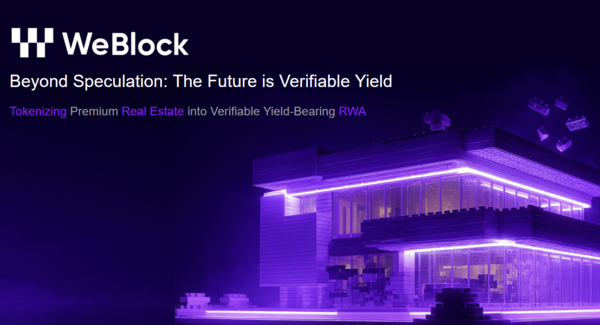Exporting Korea's Regulatory Discipline On-Chain: WeBlock Launches Institutional-Grade Real-Estate RWA Protocol

WeBlock, a Real-World Asset (RWA) protocol specializing in real estate, today announced its official entry into the global Web3 market, leveraging the expertise gained from navigating 10 years of Korea’s strictest financial regulations.
Built by an "operator-first" team of traditional real estate and project finance (PF) experts, WeBlock is launching an institutional-grade platform that tokenizes prime, income-generating properties to deliver transparent, verifiable on-chain yield.
◇ The "Regulatory Moat" Forged in Korea
WeBlock's origins lie not in speculative tokens, but in traditional finance. Founder and CEO Jisoo (Felix) Lee has advised on over KRW 500 trillion (approx. $350–400 billion) in institutional real estate transactions. Crucially, WeBlock's predecessor platform successfully navigated Korea's rigorous P2P lending booms and the demanding Online Investment-Linked Finance (OIF) license regime, maintaining a 0% principal loss rate over ten years in its lending products.
"Before we ever wrote a whitepaper, we had to pass the test of regulators and default statistics," says CEO Felix Lee. "Only after surviving ten years in Korea did we feel ready to take our model on-chain."
◇ Initial Portfolio "Bluebell": Focus on Stable Rental Income
WeBlock’s first seed portfolio, codenamed "Bluebell," consists of six roadside retail properties in core Korean locations.
Asset Profile: Each property is fully occupied under long-term leases by a high-credit global coffee franchise (single-tenant per property), boasting a Weighted Average Lease Expiry (WALE) of over 13 years.
Yield Structure: The assets are engineered to reflect the same pattern of Korean core real estate resilience: limited downside in stress scenarios and steady recovery. They provide bond-like stability rooted in long-term contractual rental income.

◇ Implementing a 3-Token Architecture for Stability
To ensure stability and attract institutional capital, WeBlock utilizes a 3-Token Architecture that clearly separates cash flow, payments, and governance functions:
RBT (Real Estate-Backed Token): Represents fractional economic rights to the property's rental income and cash flows (the yield token).
USDR (WeBlock Native Stablecoin): A stable-value token used for investments, distributions, and fee payments within the ecosystem.
WFT (WeBlock Foundation Token): The protocol’s primary governance token, with long-term value tied to the growth of Assets Under Management (AUM) and protocol fees.
This design is crucial for preventing speculative token volatility (WFT) from contaminating the stability of the income token (RBT).
◇ Global Expansion via the Singapore Gateway
WeBlock plans to use Singapore—a leading Asian hub for RWA innovation—as its bridge protocol. The goal is to connect the stringent risk management of K-Finance with the transparency of Web3, eventually enabling a family office in Singapore and a retail investor in Southeast Asia to co-invest on equal footing in the same cap table for prime Asian real estate.
WeBlock is currently raising its pre-seed funding round and preparing to bring its first global coffee franchise long-term lease portfolio on-chain.
